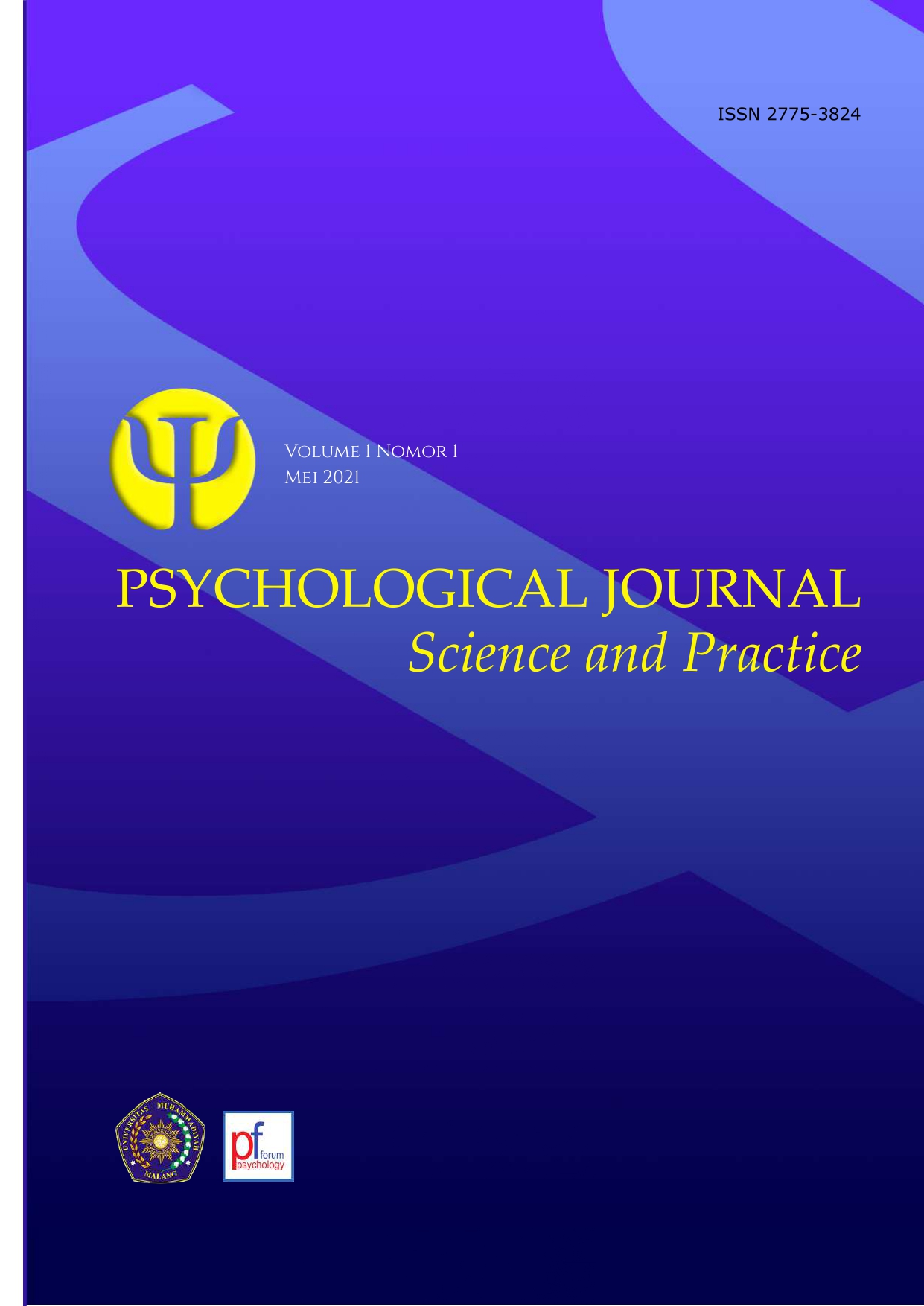Peranan religiusitas dan kecerdasan spiritual terhadap peningkatan kesejahteraan psikologis
DOI:
https://doi.org/10.22219/pjsp.v1i1.16491Keywords:
psychological well-being, religiosity, spiritual intelligenceAbstract
Psychological well-being is an indicator of individual welfare to meet the criteria for positive psychological functioning. One of the factors that can fulfill the positive psychological function is having a high religious spirit which is assisted by the ability to interpret life which cannot be separated, such as carrying out the values of truth and goodness in order to lead to prosperity. The purpose of this study was to determine the relationship between religiosity and psychological well-being and the role of spiritual intelligence in mediating the relationship between religiosity and psychological well-being. The research design used a quantitative approach measured using the dimension of religiousty scale, spiritual intelligence questionnaire (SQ) and the scale of Psychological Well-being (SPWB). The subjects used were aged 20-35, as many as 110 women who joined the malut recitation group. Data analysis using Mediated Multiple Regresson. The results showed the value of β = 0.315 P = 0.2822, which means that spiritual intelligence does not mediate the relationship between religiosity and psychological well-being. Individuals with high religiosity are proven to be able to increase psychological well-being without the role of spiritual intelligence.
Downloads
References
Abdollahzadeh, H. (2018).The 29-item Spiritual Intelligence Questionnaire.Tehran: Ravansanji Publications
Abdul,H.(2017).Agamadankesehatanmentaldalamperspektif psikologi agama. Jurnal Kesehatan Tadulako, 3(1), 1–14.
Abdul, Z., & Shah, I. (2015). Measuring Islamic Spiritual Intelligence. Procedia Economics and Finance, 31(15), 134–139. https://doi.org/10.1016/S2212-5671(15)01140-5
Armansyahfudin. (2018). Manajemen Kecerdasan Spiritual Dalam Menyikapi Paham Radikalisme di Indonesia. Jurnal Manajemen Pendidikan Islam, 3(2), 108–119.
Azalia, L., Muna, L. N., & Rusid, A. (2018). Kesejahteraan psikologis pada jemaah pengajian ditinjau dari religiusitas dan hubbud dunya. Jurnal Psikologi Islam, 4(1), 35–44.
Bastaman. (1995). Integrasi Psikologi dengan Islam Menuju Psikologi Islami. Yogyakarta : Pustaka.
Bensaid, B., Machouche, T., & Grine, F. (2014). A Qur’anic Framework for Spiritual Intelligence. 179–198. Religions, 5(1). https://doi.org/10.3390/rel5010179.
Bin, E., & Binti, Z. (2015). 7 Domains of Spiritual Intelligence from Islamic Perspective. Procedia - Social and Behavioral Sciences, 211, 568–577. https://doi.org/10.1016/j.sbspro. 2015.11.075. Creswell, J. W. (2009). Research design qualitative, quantitative, and mixed methods approaches 3rd edition. Sage Publications Ltd.
Darvishzadeh, K., & Bozorgi, Z. D. (2017). The Relationship between Resilience , Psychological Hardiness , Spiritual Intelligence , and Development of the Moral Judgement of the Female Students. Asian Social Science, 12(3), 170–176. https://doi.org/10.5539/ass.v12n3p170
Dawam, M. & Mahmudah, W. W. (2015). Pengaruh Ketaatan Beribadah Terhadap Kesehatan Mental Mahasiswa Uin Walisongo Semarang. Jurnal Ilmu Dakwah, 35(1), 35–51.
Emmons,R.A.(2000).Isspiritualityanintelligence?motivation, cognition, and the psychology of ultimate concern. International Journal of Phytoremediation, 21(1), 3–26. https://doi.org/10.1207/S15327582IJPR1001 2
Fenda, Madjida Ayu & Fahrullah, Arasy. (2019). Pengaruh kecerdasanspiritualdanpenerapanetoskerjaIslamterhadap kinerja karyawan (Studi kasus pada distributor busana muslimahMadina Collection). Jurnal Ekonomika dan Bisnis Islam, 3
Fudin, A. A. (2018). Manajemen Kecerdasan Spiritual Dalam Menyikapi Paham Radikalisme di Indonesia. Jurnal Manajemen Pendidikan Islam, 3(2), 109–120. https://doi.org/10. 31538/ndh.v3i2.64
Goleman, D. (2007). Emotional intelligence. Gramedia pustaka utama. Hadjam, M. N. R., & Nasiruddin, A. (2003). Peranan Kesulitan Ekonomi, Kepuasan Kerja dan Religiusitas Terhadap Kesejahteraan Psikologis. Jurnal Psikologi UGM, 30(2), 7280.
Hayes,A.F.(2013).IntroductiontoMediation,Moderation,and Conditional Process Analysis. Spring Street.
Hills, P., & Argyle, M. (2001). Happiness, introversionextraversionandhappyintroverts.PersonalityandIndividual Differences, 30, 595-608. https://doi.org/10.1016/S01918869(00)00058-1
Huppert, F. A. (2009). Psychological Well-being: Evidence Regarding its Causes and Consequences. Applied Psychology: Health And Well-Being, 1(2), 137–164. https://doi.org/ 10.1111/j.1758-0854.2009.01008.x
Ismail, Z. (2012). Religiosity and Psychological Well-Being. International Journal of Business and Social Science, 3(11), 20–28. Jeter, B. R. (2016). Spirituality and Psychological Well-Being Among ALS Caregivers: Hope and Perceived Stress as Mediators. Electronic Theses and Dissertations. Paper 3058. https://dc.etsu.edu/etd/3058
Joseph, S., & Diduca, D. (2014). The Dimensions of Religiosity Scale: 20- item self-report measure of religious preoccupation , guidance , conviction , and emotional involvement. November 2014, 37–41. https://doi.org/10. 1080/13674670601050295
Joshanloo, M. (2011). Investigation of the Contribution of Spirituality and Religiousness to Hedonic and Eudaimonic Well-Being in Iranian Young Adults. 915–930. https://doi. org/10.1007/s10902-010-9236-4
Jumahat, T. (2014). Perbandingan konsep kecerdasan spiritual dari perspektif Islam dan barat: satu penilaian semula. Proceeding of the International Conference on Arabic Studies and Islamic Civilization iCasic Kuala Lumpur, Malaysia, 656-666.
Kitayama, S., Markus, H. R., & Masaru Kurokawa. (2010). Culture, Emotion, and Well-being Good Feelings in Japan and the United States. Cognition and Emotion, 14(1). https: //doi.org/10.1080/026999300379003
Madjida,A.F.&A’rasy,F.(2019).Pengaruhkecerdasanspiritual dan penerapan etos kerja Islam terhadap kinerja karyawan. Journal of Chemical Information and Modeling, 53(9), 1689–1699.
Mayasari,R.(2014).ReligiusitasIslamdankebahagiaan(Sebuah telaahdenganperspektifpsikologi).Al-Munzir,7(2),81–100.
Reed, T. D., & Neville, H. A. (2014). The Influence of Religiosity and Spirituality on Psychological Well-Being Among Black Women.Journal of Black Psychology. https: //doi.org/10.1177/0095798413490956
Rohmawati,H.(2020).Fenomenadakwahdanhijrahdikalangan muslim muda milenial Surabaya. Masters thesis, UIN Sunan Ampel Surabaya.
Ryff,C.D.(1989).Happinessiseverything,orisit?Explorations on the meaning of psychological well-being. Journal of Personality and Social Psychology, 57(6), 1069–1081. https: //doi.org/10.1037/0022-3514.57.6.1069
Smith, B. (2012). Spiritual Intelligence: Definitions and Measurements. Saudi Med J, 33, 3–8. Subhan, E. H. (2020). A Literature review on Religiosty in PychologicalresearchinIndonesia:CurrentStateandFuture Direction. Jurnal Psikologi Islami, 6(1), 81–88.
Sudi, S., Sham, F. M., & Yama, P. (2017). ( Kecerdasan spiritual menurut perspektif hadis). Journal of Islamic and Contemporary Issues, 2(2), 1–11.
Sugiono. (2014). Metode Penelitian Pendidikan Pendekatan Kuantitatif R & D. Alfabeta.
Suriani, S. Fariza, M. S. & Phayilah, Y. (2016). Konsep Kecerdasan Spiritual Islam dan Barat. Journal of Sultan Alauddin Sulaiman Shah (JSASS), 3(1).
Toyibah, S. A., Sulianti, A., & Tahrir. (2017). Pengaruh Kecerdasan Spiritual Terhadap Kesejahteraan Psikologis Pada Mahasiswa Penghafal Al-Qur’an. Jurnal Psikologi Islam, 4(2), 191–204.
Zohar, D. (2001). Important Points - Danah Zohar and Ian Marshall: SQ-Spiritual Intelligence, the ultimate intelligence. Bloomsbury Publishing.
Downloads
Published
How to Cite
Issue
Section
License
Copyright (c) 2021 Nusaibah Nur Furqani

This work is licensed under a Creative Commons Attribution-ShareAlike 4.0 International License.
Authors who publish with Psychological Journal: Science and Practice (PJSP) agree to the following terms:
- For all articles published in Psychological Journal: Science and Practice (PJSP), copyright is retained by the authors. Authors give permission to the publisher to announce the work with conditions. When the manuscript is accepted for publication, the authors agree to automatic transfer of the publishing right to the publisher.
- Authors retain copyright and grant the journal right of first publication with the work simultaneously licensed under a Creative Commons Attribution-ShareAlike 4.0 International License that allows others to share the work with an acknowledgment of the work's authorship and initial publication in this journal.
- Authors are able to enter into separate, additional contractual arrangements for the non-exclusive distribution of the journal's published version of the work (e.g., post it to an institutional repository or publish it in a book), with an acknowledgment of its initial publication in this journal.
- Authors are permitted and encouraged to post their work online (e.g., in institutional repositories or on their website) prior to and during the submission process, as it can lead to productive exchanges, as well as earlier and greater citation of published wor (See The Effect of Open Access).
This work is licensed under a Creative Commons Attribution-ShareAlike 4.0 International License.








